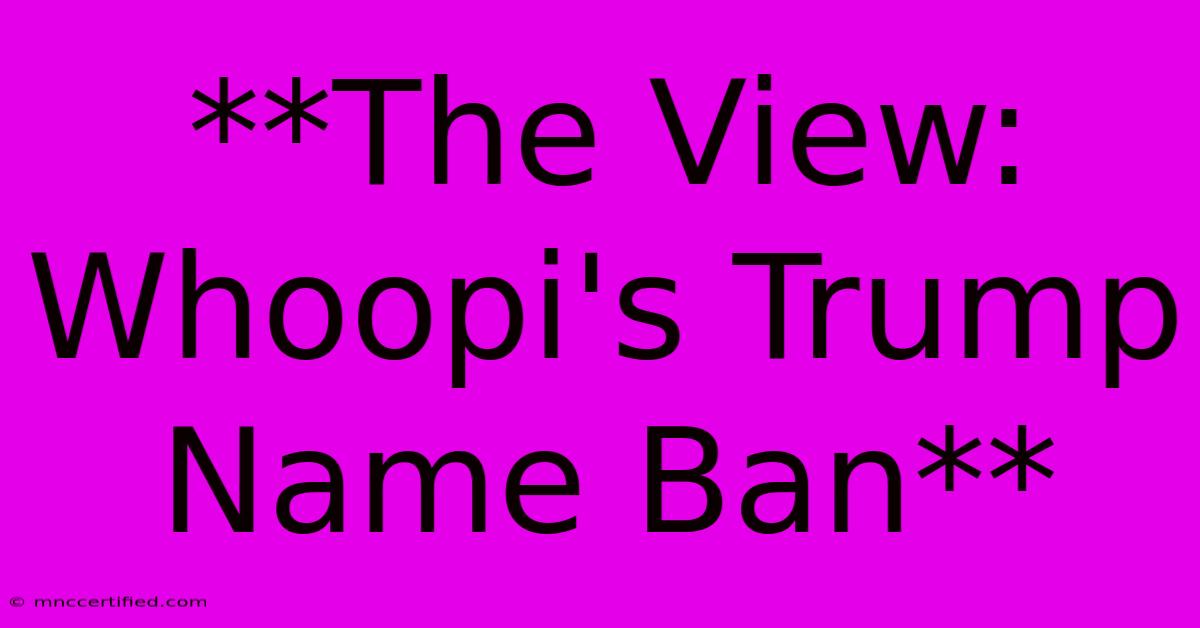**The View: Whoopi's Trump Name Ban**

Table of Contents
The View: Whoopi's Trump Name Ban and the Controversy It Sparked
The long-running daytime talk show The View has a history of stirring up conversation and controversy, but few moments have been as talked about as Whoopi Goldberg's attempt to ban the mention of former President Donald Trump's name on the show. This decision, made in the wake of the January 6th Capitol riot, sparked a firestorm of debate, raising questions about free speech, political bias, and the role of a popular talk show in a polarized political climate.
The Ban and the Backlash
In the immediate aftermath of the Capitol riot, Whoopi, a co-host on The View, expressed her desire to create a space on the show where Trump's name wouldn't be uttered. Her reasoning was simple: she wanted to move past the "Trump era" and focus on the future. This attempt to ban Trump's name, however, was met with immediate and fierce backlash.
Critics argued that the ban was an attempt to censor free speech and stifle important political discourse. They pointed out that the show regularly discusses other controversial figures and issues, making the ban on Trump seem arbitrary and politically motivated. Supporters of the ban, on the other hand, argued that it was a necessary step to prevent the constant rehashing of divisive rhetoric and focus on more productive conversations.
The Debate: Free Speech vs. Political Discourse
At the heart of this controversy is the fundamental question of free speech versus the responsibility of a popular platform to foster constructive dialogue. While some argued that the ban was an affront to freedom of expression, others countered that The View has the right to curate its content and choose the topics it covers.
The debate also highlighted the issue of political bias, a recurring criticism leveled at The View. Critics argued that the ban demonstrated a clear left-leaning bias, while supporters pointed out that the show has always leaned left and that the ban was simply an extension of that perspective.
The Aftermath and Lasting Impact
Ultimately, the ban on Trump's name was short-lived. It quickly became apparent that it was impractical and unsustainable, and the show resumed its usual practice of discussing the former president. However, the controversy surrounding the ban had a lasting impact, serving as a reminder of the complex and often contradictory dynamics of free speech, political bias, and the role of media in shaping public discourse.
The incident also sparked a renewed discussion about the responsibility of popular platforms to foster dialogue and promote understanding in a highly polarized political landscape. It remains a compelling example of the challenges faced by media outlets in navigating the delicate balance between freedom of expression and the desire to create a more civil and constructive public discourse.

Thank you for visiting our website wich cover about **The View: Whoopi's Trump Name Ban** . We hope the information provided has been useful to you. Feel free to contact us if you have any questions or need further assistance. See you next time and dont miss to bookmark.
Featured Posts
-
Project 2025 Unveiling The Reality
Nov 07, 2024
-
Old Surety Life Insurance Provider Portal
Nov 07, 2024
-
Forex Trading Website Script Free Download
Nov 07, 2024
-
Stacking Vs Non Stacking Insurance Florida
Nov 07, 2024
-
Uefa Champions League Live Score Bayern Vs Benfica
Nov 07, 2024